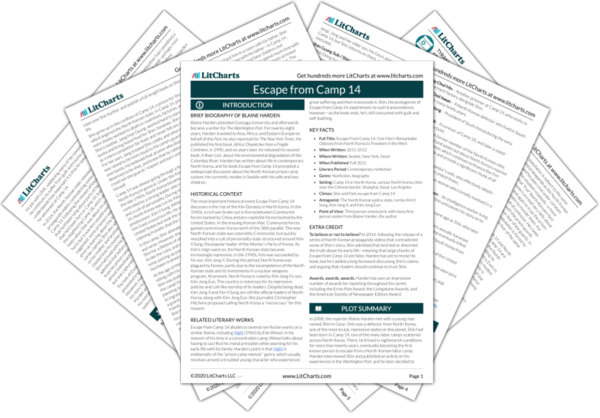Summary
Analysis
For ten months, Shin lives on the ranch where the pig farmer left him. He works alongside two Chinese cowhands, neither of whom speak his language. Shin has no idea what to do next—Park had been in charge of planning the duo’s time in China. However, during his time on the ranch, Shin’s legs heal, he learns Chinese, and he grows healthier. He also begins listening to the radio, through which he learns stories about the food shortages in North Korea.
Shin’s time on the ranch was useful, because he was able to feed himself, get healthier, and plan his future while learning to speak enough Chinese to get around. As he immersed himself in Chinese radio, Shin began to realize how corrupt and incompetent his own country’s government really was.
Themes
In North Korea, citizens are forbidden to listen to the radio. However, defectors smuggle radios from China into North Korea and sell them on the black market. Some defectors have since claimed that listening to the radio motivated them to leave North Korea in the first place. Shin loves listening to the radio because it feels good to hear Korean; however, because Shin has little to no experience with the world outside Camp 14, many radio broadcasts confuse him. He has nobody with whom to discuss the radio broadcasts, and as a result he becomes very lonely.
Although Shin’s life was, by any objective standard, getting better and better, he also faced new problems in his new situation: he had enough food and shelter to survive, but he had to contend with a crushing loneliness that he’d never felt—and, indeed, had never had the time to feel—before.
Themes
Toward the end of 2005, Shin decides to travel southwest, find some friendly Koreans, and get a stable job. He’s essentially given up ever moving to South Korea. He collects some money from the ranch manager—much less than he expected—along with a map. Traveling away from the ranch, Shin meets many other North Korean defectors, and Shin realizes that he’s not alone. Few people ask for his identification papers. He visits Korean churches and begs for work. Some pastors offer him money, but others tell him to go away.
As before, Shin benefited from a robust network of Koreans living in China, many of whom had fled from the Kim dynasty themselves.
Themes
Shin travels to Beijing, where he tries to find work in a restaurant, but doesn’t succeed. However, he never panics—after a lifetime of hunger and cruelty, Shin knows that he’d never come as close to starving as he has in Camp 14. In February, Shin arrives in Hangzhou, where he finally succeeds in getting a restaurant job. He works long hours and soon has enough money for a bus ticket to Shanghai.
Shin kept a relatively clear head, recognizing that his life was getting better and better, even if he now faced a crippling sense of loneliness. As a result, he never seriously panicked.
Themes
Get the entire Escape from Camp 14 LitChart as a printable PDF.

In Shanghai, Shin resumes his search for restaurant work. At one restaurant, he happens to meet a journalist who works for a major South Korean media company. The journalist asks him if he wants to go to South Korea. He tells Shin to get into a cab with him, and the cab takes them to the South Korean embassy. At the embassy, however, Shin begins to feel afraid. He sees police officers everywhere, and doesn’t understand the concept of seeking asylum. Nevertheless, the journalist makes arrangements, and Shin continues to live in the consulate while he waits for his paperwork to be processed.
Shin caught another lucky break when he ran into a journalist who wanted to bring him into South Korea and interview him about his time in North Korean prison camp. Had Shin not crossed paths with this journalist, it’s likely that the world would never have heard Shin’s story—so it also follows that there might be other people like Shin living anonymously in China right now.
Themes
After living in the consulate for six months, Shin’s papers come through, and the journalist arranges for him to travel to Seoul. There, the South Korean National Intelligence Service interview him about his time in North Korea. (One intelligence worker, Sergeant Matthew E. McMahon, later remembered Shin seeming fragile and traumatized.) McMahon pens a report based on Shin’s descriptions of Camp 14, and he passes the report on to U.S. intelligence.
Shin had survived his time in Camp 14 (or, as he later admitted, Camp 18), but he was weak and psychologically traumatized by what he’d experienced there. Meanwhile, Shin’s reports about the state of life in the North Korean prison camps attracted attention within the U.S. government—although, as Harden emphasizes, this attention didn’t result in any serious changes in U.S. policy.
Themes












